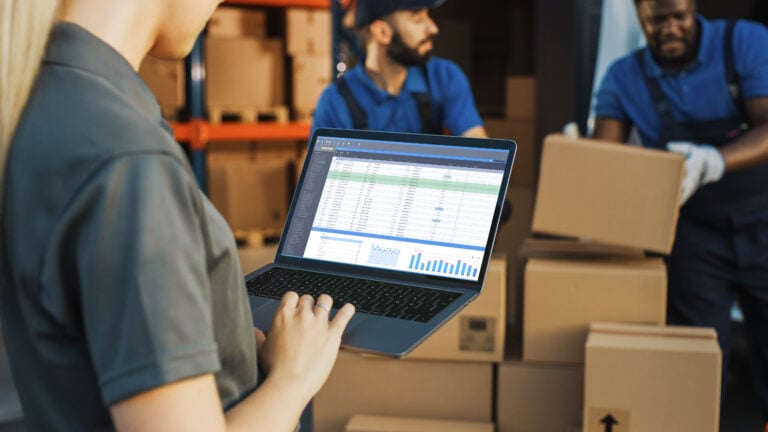AI, IoT, and data analytics have remarkable potential to bring a digital revolution to the logistics industry. They provide an efficient framework through which logistics companies can interconnect their assets (like trucks, trailers, trucking equipment, etc.). Thanks to the advancements in these technologies, the days when carriers had to handle everything manually are gone.
IoT-powered devices allow truckers to have real-time visibility into their operations, on-time maintenance of their equipment, and accurate record maintenance of shipments and transactions. With the right AI solution, trucking companies can connect all their assets to a cloud-based system, allowing them to manage their operations efficiently, even from remote locations. Data analytics is proving to be a game-changer for the logistics industry, as it allows companies to make informed decisions regarding their fleet management and supply chain operations.
Here, we’ve summarized ways AI, IoT, and data analytics can increase logistics efficiency.
#1 Real-time tracking of shipments and trucking equipment
IoT refers to a network of interconnected devices that can exchange data among them and with cloud-based software. The logistics industry leverages IoT systems to ensure real-time tracking of shipments and trucking equipment during transit. For this purpose, IoT devices, like sensors, activity trackers, and programmed gadgets, are installed in the trucks carrying shipments. These devices exchange accurate GPS-based data with the logistics company’s cloud system, allowing them to know the real-time location of the shipments.
#2 Effective fleet management
Fleet management is a key element of logistics. Trucking companies are leveraging IoT-based scanners to manage their fleets more effectively. These scanners provide useful information about truck maintenance, functioning, and usage. Fleet managers use this information to schedule fleet maintenance, helping them reduce downtime. Companies can monitor the performance of drivers, driving speed, and trucks’ engine performance by using AI-powered computing devices.
#3 Efficient route optimization
IoT technology provides valuable data-driven insights to help carriers optimize their routes more efficiently. With advanced AI-powered detectors, truckers can get information about the traffic, loopholes, and obstructions on specified routes, allowing them to reroute their shipments to ensure on-time delivery. Drivers can use AI devices to choose the shortest route to deliver freight quickly and reduce fuel consumption.
#4 Data analytics fosters efficiency
Data analytics coupled with AI and IoT can help truckers boost efficiency, navigate market fluctuations, maintain supply-demand balance, and overcome hunches to stay competitive. Analytics empowers companies with the correct data that can help them understand the freight cycle and shipping patterns to make informed decisions. It can help truckers consider different factors, such as volatility, lane economics, and seasonality, while determining their shipping rates, protecting their profits, and bringing growth.
#5 High-quality customer service
AI and IoT help logistics companies improve customer support by meeting the ever-growing customer demands, ensuring faster and safer freight delivery, and providing real-time visibility. With AI-based chatbots, companies can entertain their customers’ queries quickly. These chatbots also inform customers about any shipment delays and disruptions.
#6 DOT Compliance
Unlike traditional logbooks that require drivers to manually enter their duty hours and truck activity, IoT-based digital logging devices manage all these tasks automatically. They digitally log the driver’s duty hours and vehicle activity, helping logistics companies comply with the rules and regulations made by the Department of Transport (DOT) of the respective countries.
Conclusion
As the logistics industry evolves, AI, IoT, and data analytics are pivotal in driving efficiency and optimizing operations. These technologies enable carriers to address current challenges, including HR shortages, by automating tasks and improving decision-making processes. However, they might introduce issues like data security concerns and the constant need for continuous technological adaptation. In essence, the future of logistics lies in balancing the adoption of these advanced technologies with managing their inherent complexities. This approach will not only streamline operations but also ensure sustainable growth in a rapidly evolving digital landscape.









